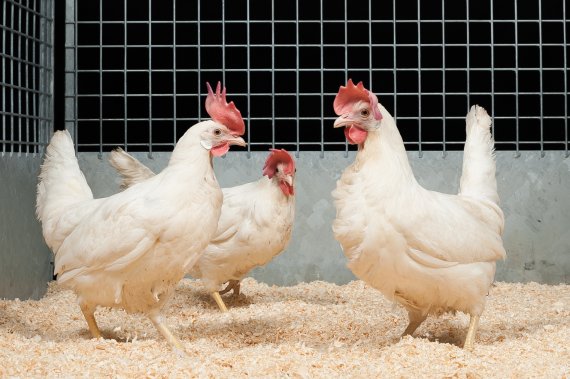©Tom Berghof
Some hens are more likely to catch a disease than others. If a nasty bacterium haunts through a coop, some hens will perish while others will survive. This natural variation is partially genetically defined, as was discovered by one of Tom Berghof’s predecessors at the Adaptation Physiology group. She found that laying hens with high amounts of natural antibodies have a lower mortality. ‘That was the starting point of my research’, says Berghof.
Natural antibodies are part of the hen’s immune system. These proteins recognise pathogens which the animal has not encountered before. Berghof thinks that they recognise and inhibit all bacterial pathogens. He has proven the working of the antibodies on one type of bacterium.
Breeding lines
Berghof was given a female breeding line from the breeding company Hendrix Genetics. He measured the amounts of natural antibodies in the hens’ blood at sixteen weeks old. Following this procedure, he selected two lines of hens with high and low levels of natural antibodies. After four and six generations, he exposed these ‘high’ and ‘low’ lines to pathogenic E. coli bacteria. The high line, which had over four times as many natural antibodies, was far less often infected and perished significantly slower. ‘The antibodies suppress the bacterial infection’, the PhD candidate concluded.
Production
He also made another interesting discovery. Previous research into robust hens suggested a trade-off between production and health: hens investing more in immunity produce less. But no such thing became apparent during Berghof’s experiments. ‘The chicks with more antibodies probably invest in their immunity at a young age, before they start laying eggs, and have an advantage once they do start laying.’ He advises Hendrix Genetics to breed for natural antibodies.
‘The great thing about breeding for natural antibodies is that you use the natural potential of the hens’, says Berghof. ‘Besides, the genetic approach yields a long-term improvement, as the higher immunity is permanently coded.’
Well-being
Berghof thinks this could provide considerable societal advantages. ‘A disease will not spread as easily or quickly in a coop with laying hens that have high amounts of natural antibodies, causing fewer animals to get sick too. This would lead to lower losses, higher well-being and a lesser use of antibiotics. But there will always be animal diseases that are too strong for antibodies. Those should be fought using vaccines or management measures.’
Larger experiment
Hendrix Genetics will get to work with the results. ‘This research has made clear that natural antibodies are hereditary and that selection on this characteristic contributes to an improvement of the immunity’, says Johan van Arendonk, chief Innovation & Technology Officer at Hendrix Genetics. The breeding company has set up an even larger experiment to determine what the consequences of selection for natural antibodies will be not only on the immunity, but on other characteristics as well. ‘It is of utmost importance for us to make sure the animals are balanced’, says Van Arendonk, who was professor of Animal Breeding and Genetics in Wageningen until three years ago.

